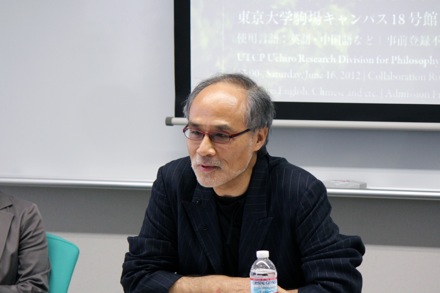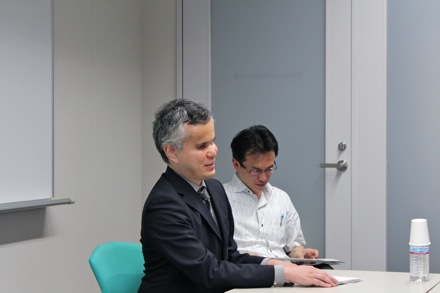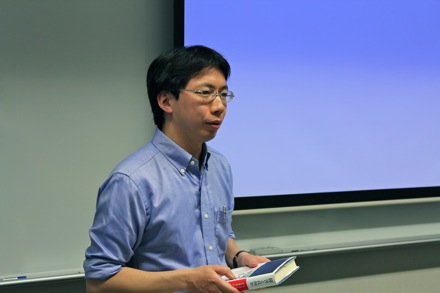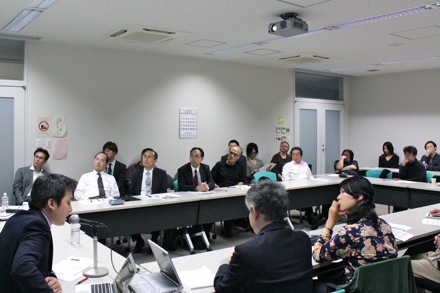[Report] The Uehiro Research Division for Philosophy of Co-existence Opening Symposium "Ethics in Change"
The Uehiro Research Division for Philosophy of Co-existence Opening Symposium "Ethics in Change" was held at the University of Tokyo on 16 June 2012. The symposium addressed the idea of co-existence between human beings, between human beings and nature, between human beings and technology, and between science and humanities. It brought these concepts together in a novel philosophical approach that encouraged an enthusiastic and fruitful discussion, a discussion that inspired deeper thought in this subject area, yet traversed the multitude of ideas with ease. Associate Professor Shinji Kajitani (University of Tokyo) was the leading moderator of the symposium.

Professor Yasuo Kobayashi (University of Tokyo) gave the opening address in which he proposed that we need a new philosophy that empowers the humanities to challenge fixed assumptions of the norm and proposed new ethical ideas based on truth-in-our-day-to-day lives. After 3.11 (the Great East Japan Earthquake), Japan faced many serious issues such as natural and manmade disasters, in particular, the current nuclear and radiation calamities in Fukushima. Due to the 3.11 disasters, our perceptions about our lives have radically changed. Those in the affected areas and the non-affected areas need to co-exist; we need to listen to the unspoken voice of those who are affected and question the mainstream norm. In order to do so, we need to promote dialogues between the sciences, technology and the humanities, between nations, between different people, and between those of different abilities. Professor Kobayashi concluded that UTCP has a new philosophical undertaking to reconsider the notion of co-existence in order to find a way of being together in the world.
Several thought-provoking presentations followed which may be described as broadly falling into the following two main sessions:
Session 1: Philosophy of Disability and Co-existence
Associate Professor Takahiro Nakajima chaired the first session. He provided a dialogical bridge between the opening speech given by Professor Kobayashi and a new project entitled “philosophy of Disability and Co-existence”. This is one of the primary projects in the Uehiro Research Division for Philosophy of Co-existence. There were two speakers: Dr Ryoji Hoshika (the University of Tokyo) and Associate Professor Koji Ishihara (the University of Tokyo).

Dr Hoshika called into question the very definition of disability, and started asking some simple questions such as: “what is disability?” and “is there any particular phenomenon of disability?”. Rather than treating disability as a medical or physiological phenomenon, his sociological standpoint captures disability as a social phenomenon. Instead of the repetition of the existing concept of disability and its theoretical application and implication, he argues that we need to establish an active device concept for representing the social experiences of people with disabilities more appropriately. Dr Hoshika’s main claim could be seen as the politics of disadvantage in relation to disability.

Associate Professor Ishihara gave his talk in reply to Dr Hoshika, and expounded the new project. Initially, he explained the background of former research projects related to the “Philosophy of Disability and Co-existence (PhDC) project and its prospects. PhDC has offered the same opening that Dr Hoshika prompted: “what is disability?” According to Associate Professor Ishihara, when we consider co-existence, we are engaging in a dialogue of the co-existence between the able-normative and the disabled, and there is always the premise that there are differences between the two. He believes that to promote co-existence is not necessarily to iron out differences, and that we need to emphasise the difference in order to co-exist in the world. The mission of the PhDC project is to focus on philosophical approaches to disability and co-existence.
Session 2: Co-existential Dialogue between Eastern and Western Philosophy
There are three speakers in Session 2: Dr Masato Ishida (University of Hawaii), Dr Kevin Lam Wing-keung (University of Tokyo), and Associate Professor Tsuyoshi Ishii (University of Tokyo). They postulated that a co-existential dialogue between Eastern and Western philosophy is desirable since it is based upon a multi-dimensional perspective. In dialogue, ideas cannot be imposed upon the other and we should respect the thoughts of the other side and its political and cultural integrity. Only in such a situation can dialogue be a preliminary step towards a process of reconsideration of our current situations.

In Dr Ishida's talk, titled: "Surrounding Seas and Deserts: Whither the Dialogue?", he outlined the academic activities established and being practiced at the University of Hawaii. He presented examples from their disability studies such as their Philosophy for Children in Hawaii (P4C) programme, Islamic philosophy, Japanese studies, and Okinawan studies. These studies may be considered as a dialogue, and profound, thoughtful and precise dialogue with others can be helpful in questioning and challenging the fixed assumption about the world from a Western, white, middle-class and able-bodied perspective. In order to find sensible solutions to some of the critical issues that overwhelm the world today, he argued that we need to rethink the boundaries and complexities between/within us; hence, to view "Japan on the broader Pacific rims".
Dr Kevin Lam Wing-keung, in his talk: "Transcultural Ethics: Lessons from Modern Sino-Japanese Philosophy", addressed the importance of `trans-ness` in ethics and philosophy. He began by positioning himself as a hybrid researcher from Hong Kong who has studied both Japanese and Chinese philosophy. His simple but important question: "What is Japanese philosophy?" inspired the audience. He moved onto transcultural ethics and developed the notion of "conviviality" to articulate the sensible meaning of co-existence.
Finally, Associate Professor Ishii talked about the Chinese film titled: “Still Life” (2006). Directed by Jia Zhangke, it is a story about the social restlessness in modern China and the many different kinds of human lives (fates) in the ever-changing globalised world. He postulated that the film enlightens us by elaborating the complexity of relationships. He maintained that the crises in the relationship between human beings and nature, the ethical dilemma that has developed in techno-scientific research, and many more issues of this nature should be among the topics on the agenda of a dialogue between Eastern and Western philosophy.

Closing speeches were provided by Dr Noboru Maruyama (Secretary-General of the Uehiro Foundation on Ethics and Education), Associate Professor Shinji Kajitani (University of Tokyo), and Assistant Professor Futoshi Hoshino (UTCP). Dr Maruyama's stimulating speech encouraged UTPC researchers to contribute further to the innovation of philosophy and its education to make the world a better place. Associate Professor Shinji Kajitani spoke about his hopes and aspirations in relation to the future possibilities of UTCP. As one of the researchers of the Uehiro Research Division for Philosophy of Co-existence UTCP, and their behalf, Assistant Professor Hoshino expressed his gratitude to the Uehiro Foundation on Ethics and Education, which has, and continues to offer us the possibility to conduct these vital projects.
(Report: Minae Inahara)






